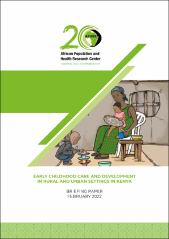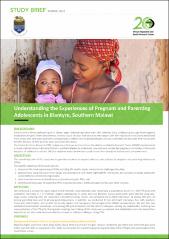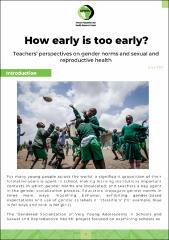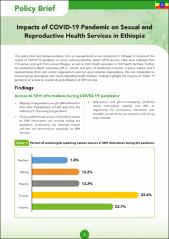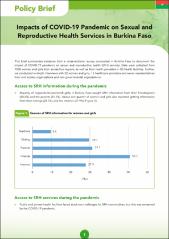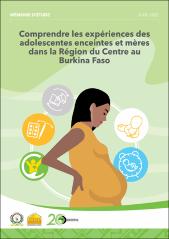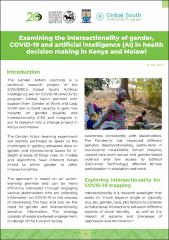Browsing Briefing Papers by Issue Date
Now showing items 1-20 of 42
-
The Potential of the Baby-Friendly Community Initiative to Improve Early Child Development Outcomes and the Feasibility of Integrating Care for Child Development into the Package
(APHRC, 2019-04)The Baby Friendly Hospital Initiative (BFHI) model, was developed by the World Health Organization (WHO) to globally promote optimum breastfeeding in maternity wards in line with the International Code of Marketing ... -
Dietary Transitions in Kenyan Cities: Leveraging Evidence for Intervention and Policy to Prevent Diet-related Non-Communicable Diseases
(APHRC, 2019-05)Kenya is experiencing a nutrition transition with some evidence of changes in dietary habits in urban areas. As a consequence, obesity and diet-related non-communicable diseases (DR-NCDs) are rapidly increasing and ... -
Leaving no Woman or Child Behind: Addressing Health Inequalities in Zambia
(APHRC, 2019-07)Zambia remains one of the countries in the sub-Sahran region with the highest maternal and child mortality ratios. Although Zambia has made progress in reducing maternal deaths from the estimated 729 per 100,000 live ... -
How early is too early? Adolescents’ perspective on gender norms and sexual and reproductive health
(APHRC, 2020-07)Adolescent risky sexual behaviours and poor reproductive health outcomes have often been linked with gender norms, beliefs and practices that instigate inequalities between males and females. Inequitable gender norms are ... -
The State of Education and Implications of SRHR on the Education of Adolescent Girls in Senegal
(APHRC, 2020-09)In Senegal, adolescents aged between 10 and 19 years, and young adults aged 20-24 represent 22.5% and 9% of the general population respectively (ANSD, RGPHAE 2013). Senegal is one of five countries globally with the ... -
Restoring Nairobi to “A Place of Cool Waters”
(APHRC, 2021-01)Nairobi, the capital of Kenya, prides itself on its arboretum and its variety of parks and open green spaces. Directly translated from Say Maa, the language of the Indigenous Massai people, Nairobi means “cool waters” in ... -
The Case of Dakar and Ziguinchor: Similar yet Different (comparable education outcomes but distinctive SRHR indicators)
(APHRC, 2022-01)Dakar and Ziguinchor are two regions with similar geographic -both bordered by the Atlantic ocean- and cosmopolitan character/attributes. While Ziguinchor presents other advantages from its neighboring countries such ... -
Expériences de l’avortement au Bénin : déterminants sociaux et parcours de soins dans le département de l’Atlantique
(APHRC, 2022-01)Au Bénin, on estime que les décès liés aux avortements provoqués et non sécurisés causent entre 15 et 20% des décès maternels.1 Du fait de la restriction juridique et du stigma social autour l’avortement, de nombreuses ... -
Early Childhood Care and Development In Rural and Urban Settings in Kenya
(APHRC, 2022-02)Informal childcare centers have sprung up to meet the growing demand for child care in urban informal settlements. This has resulted from the significant increase in the number of women engaging in paid employment outside ... -
Early Childhood Care and Development In Rural and Urban Settings in Kenya
(APHRC, 2022-02)The early years are critical for children's optimal health and developmental outcomes. However, too many children are spending their early years in suboptimal environments, with negative implications for their development ... -
A Synthesis Note: tracing the journey of the Development of the National Sanitation Management Policy in Kenya
(APHRC, 2022-03)This synthesis note summarizes the process taken in developing the Naonal Sanitaon Management Policy (NSMP) in Kenya. It provides a brief background of how the process unfolded, describes the policy windows that were ... -
Understanding the Experiment of Pregnant and Parenting Adolescent in Blantyre, Southern Malawi
(APHRC, 2022-03)Close to one in three girls in Malawi begin child bearing before their 19th birthday. Early childbearing has negative implication for girls' health. -
Impact of the COVID-19 Pandemic on Sexual and Reproductive Health Services in Burkina Faso, Ethiopia, Kenya, Malawi and Uganda
(APHRC, 2022-05)This policy brief summarizes evidence from a comparative analysis of five selected sub-Saharan Africa countries, highlighting the overall impacts of the COVID-19 pandemic on the availability of, access to, and use of ... -
How early is too early? Teachers’ Perspectives on Gender Norms and Sexual and Reproductive Health
(APHRC, 2022-05)For many young people across the world a significant proportion of theirformative years is spent in school, making learning institutions importantcontexts in which gender norms are inculcated; and teachers a key agentin ... -
Examination of LGBT People’s Lived Experiences and Public Perceptions of Sexual and Gender Minorities in Rwanda
(APHRC, 2022-05)This policy brief summarizes evidence from a study conducted in Rwanda by the Health Development Initiative (HDI) Rwanda and the African Population and Health Research Center (APHRC). The study’s aim was to understand ... -
Impacts of COVID-19 Pandemic on Sexual and Reproductive Health Services in Ethiopia
(APHRC, 2022-05)This policy brief summarizes evidence from a cross-sectional survey conducted in Ethiopia to document the impact of COVID-19 pandemic on sexual and reproductive health (SRH) services. Data were collected from 114 women ... -
Impacts of COVID-19 Pandemic on Sexual and Reproductive Health Services in Burkina Faso
(APHRC, 2022-05)This brief summarizes evidence from a cross-sectional survey conducted in Burkina Faso to document the impact of COVID-19 pandemic on sexual and reproductive health (SRH) services. Data were collected from 1000 women and ... -
Impacts of COVID-19 Pandemic on Sexual and Reproductive Health Services in Uganda
(APHRC, 2022-05)This policy brief summarizes evidence from a cross-sectional survey conducted in Uganda to document the impact of COVID-19 pandemic on sexual and reproductive health (SRH) services. Data were collected from 543 women and ... -
Comprendre les expériences des adolescentes enceintes et mères dans la Région du Centre au Burkina Faso
(APHRC, 2022-06)COMME dans plusieurs pays de l’Afrique subsaharienne, le Burkina Faso a un taux de fécondité élevé chez les adolescentes, avec 132 naissances pour 1000 filles. Or, les grossesses précoces et non désirées peuvent avoir ... -
Examining the Intersectionality of Gender, COVID-19 and Artificial Intelligence (AI) in Health Decision Making in Kenya and Malawi
(APHRC, 2022-06)The Gender Action Learning is a technical research project of the SIDA/IDRC’s Global South Artificial Intelligence (AI) for COVID-19 (AI4COVID) program. Global South partners with support from Gender at Work and ...









